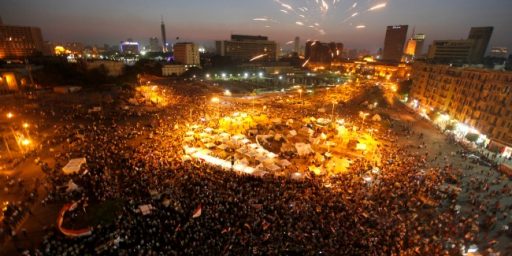Institutional Clash in Egypt
They are playing the game without rules in Egypt.
 Via the NYT: Egyptian Judges Challenge Morsi Over New Power.
Via the NYT: Egyptian Judges Challenge Morsi Over New Power.
Egyptian judges rebelled Saturday against an edict by President Mohamed Morsi exempting his decrees from judicial review until ratification of a constitution, denouncing it as a bid for unchecked power and calling for a judges’ strike.
The condemnation came from an array of organizations. The Supreme Council of the Judiciary called the decree “an unprecedented attack on judicial independence” and urged the president to rescind it. A major association of judges, the Judges Club, called for a strike by courts across Egypt. The leader of the national lawyers’ association endorsed the call.
A judicial strike would be the steepest escalation yet in a political struggle between the country’s new Islamist leaders and the institutions of the old authoritarian government over the drafting of a new constitution.
Of course, griping and strikes will only go so far. The real question is whether the courts will attempt to nullify the edict issues by Morsi.
Of course, the courts have helped create this situation:
Because the court dissolved the Parliament, the judiciary was the last check on his power, and critics called the decree a step toward autocracy.
Also:
What set off the battle was the year-end deadline for the Constitutional Assembly chosen last spring to draft a new constitution. There had been rumors that the Supreme Constitutional Court was poised to dissolve the assembly in a ruling next Sunday. Top courts had already dissolved both an earlier Constitutional Assembly and the Parliament. All three bodies were dominated by Islamists, who have prevailed in elections, and many of the top judges harbor deep fears of an Islamist takeover.
The root of much of the problem in Egypt going back to the days after Mubarak was ousted is the lack of a new constitution. There needs to be an inclusive process by which a new constitution was established to provide the framework for a government post-regime change. Instead there was a minor tweaking of the existing constitution and a number of aconsitutional moves (first by the military, later by the courts, now by Morsi). They are playing the game without rules in Egypt.
As I noted back in June: the Egyptian transition has been a mess that demonstrates the sequencing matters:
The more appropriate route for the transition would have been the calling of constituent assembly to write a new constitution that would have established the rule of the game going forward. Instead, the existing constitution was altered and then a quick move was made to first parliamentary and now presidential elections. These processes, which are essential for the establishment of a viable new governing system, were clearly not well thought out. The first round of the presidential election was a bit of a mess, and has led to one of the candidate being highly controversial and now the election of one-third of the parliament has been declared unconstitutional.
The current situation is just a the ongoing consequences of these poor choices.
I think, by the way, that Marc Lynch is correct regarding the current situation:
Morsi’s move should be seen in the context of Cairo’s intensely polarized, gridlocked politics rather than as some pure expression of Islamist intent. His power is more impressive on paper than in reality. But there is no real question that Morsi went too far: decrees changing the rules of the game and placing the executive above any appeal were dangerous and wrong when done by the SCAF, would have been dangerous and wrong if done by a President Shafik, and they are dangerous and wrong when done by Morsi. They should be reversed. But that will no more solve the underlying problems than last week’s Israel-Hamas ceasefire will solve the enduring problems of Gaza.
Emphasis mine.
Clearly it is unhealthy for any hope of democratic evolution in Egypt for the executive to be issuing edicts of this nature, and I agree with Lynch that they should be reversed. However, it is truly unclear at the moment as to whether the edicts actually mean more power or not. I remain unconvinced that the military is still not the most powerful institution in Egypt and is simply letting the current situation play itself out to see how it out to position itself.

![Military Coup Underway In Egypt [Update: Morsi Deposed]](https://otb.cachefly.net/wp-content/uploads/2011/02/egypt-flag3-512x256.gif)




Your closing thoughts may end up being correct, time will tell. The one intervening factor that comes to mind are the recent changes that Morsi forced int he military leadership and the suspicion of some that the new leadership may be less assertive than their predecessors.
Of course, the other side of the coin is that, if the military does decide to intervene at some point, then one wonders how the public will react. The reaction to Morsi’s recent decrees seems to have been overwhelmingly negative.
Then again, if the nation descends into chaos or something approaching it, people may welcome what appears to be the calming hand of the military.
@Doug Mataconis: I would go a step further and note that I am not convinced that the military has fully retreated from politics. They still own, for example, a substantial amount of the Egyptian economy. I think assumptions that they have been neutered are probably incorrect. How this all manifests remains to be seen.
The Arab spring was and is not so much a desire to overthrow tyrants or religion but economics. When you have 100s of thousands if not millions of young men and women without jobs or any hope for the future you are going to have turmoil. The ever increasing cost of food is another problem. The religious fanatics are able to take advantage of this frustration.
I think that, at basis, you are dealing with states who do not have viable economies. All of these histrionics are, IMO, symptoms of that underlying weakness.
@Ron Beasley: They can only take short-term advantage. They still have to solve the problem and are completely unequipped to do so. Piety doesn’t put bread on the table.
@John Burgess: This quote from a sci fi novel I think is spot on:
When things are hopeless people turn to mythology. That’s true in the mid east but my concern is that is and will happen here as the economy continues to deteriorate.
Morsi overreached and is a dubious character, but OTOH recall how Weimar Germany was tethered by reactionary judges carried over from the old regime. Morsi may have correctly named a problem, even if his solution was unacceptable.
The real war:
https://www.sciencedirect.com/science/article/pii/S0378426612002920
Islamic vs. conventional banking: Business model, efficiency and stability
Which side Morsi is on, I am not qualified to say, though at least superficially, one would think he is on the side of Islamic banking.
You can tell some peoples/cultures aren’t used to the democracy thing when they get elected with ~60% of the vote and think the other ~40% aren’t still capable of revolution.